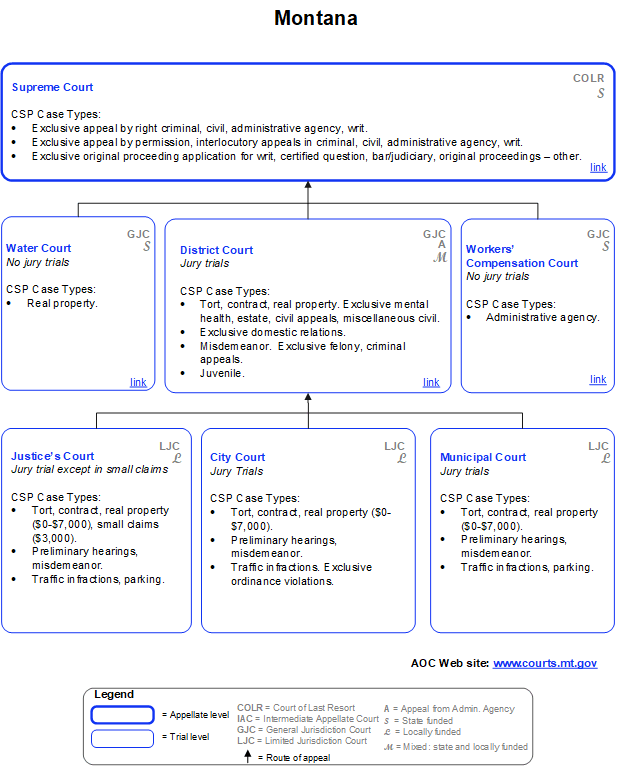An overview of the various Montana courts that may be involved in your personal injury case
So you've made the decision to file a personal injury lawsuit. Which courthouse should you head to?
In Montana, there are 3 main court systems where you might file your lawsuit:
- Justice of the peace courts
- State-level district courts
- Federal court
The overwhelming majority of personal injury cases are filed in the state-level district court in the county where the defendant lives. However, in some instances, your lawsuit might be filed in 1 of the other courts.

Let's explore all 3 of these court systems, along with a couple other courts where you're less likely to file your lawsuit.
Justice of the peace courts
Montana justice of the peace courts have “limited jurisdiction.” This means that the courts only have the power to hear certain types of cases. These cases include:
- Civil matters involving $12,000 or less in damages
- Misdemeanor charges of driving under the influence (DUI)
- Traffic violations
- Protection orders
Each county in Montana has at least 1 justice of the peace court. In most cases, transcripts of justice of the peace court proceedings are not kept.
In addition to the cases listed above, justice of the peace courts hear small claims cases. In order to qualify as a “small claims case,” the case must involve $7,000 or less in dispute. Small claims cases are quick and informal. The Montana Rules of Evidence don't apply and a party can't be represented by an attorney unless ALL parties are represented by an attorney.
Notably, Montana also has city courts and municipal courts, which are similar to justice of the peace courts. City courts hear the same types of cases as justice of the peace courts, but city courts also hear city-related issues (such as city ordinance violations). Municipal courts hear the same types of cases as justice of the peace courts, but the judges must have additional qualifications and the courts can issue warrants.
State-level district courts
Montana district courts cover more territory than justice of the peace courts. There are only 22 district courts in Montana and each district court handles cases for several nearby counties.
District courts are courts of “general jurisdiction,” which means they handle all cases that aren't specifically reserved for another court. This includes:
- Tort cases
- Contract cases
- Property rights cases
- Criminal cases
- Divorce cases
Unless your personal injury case seeks damages less than $12,000, it will most likely be filed in district court. District court cases don't have a case-in-controversy requirement. This means that the court can hear cases involving any amount of damages.
Cases heard in district court are more formal than those heard in justice of the peace courts. District court cases must follow several different sets of rules, including the Montana Rules of Civil Procedure, the Uniform District Court Rules, and the local district court rules. District court cases are decided by either a judge or jury.
Montana Supreme Court
The Montana Supreme Court is the state's highest court. It consists of a chief justice and 6 associate justices. In all likelihood, your personal injury case will not be heard by the Montana Supreme Court. The Montana Supreme Court only hears 2 types of cases:
- Appeals. The Montana Supreme Court hears cases that are appealed from lower courts (such as district courts).
- Original jurisdiction. The Montana Supreme Court hears certain cases involving very specific circumstances, including habeas corpus writs (requests for the court to sign an order demanding that a public official deliver an imprisoned individual to the court and show a valid reason for that person's detention).
The Montana Supreme Court has supervisory authority over all courts of the state. This means that the Montana Supreme Court determines rules relating to the court procedures for all other courts.
Federal courts
The United States District Court for the District of Montana is the federal court located in Montana. The federal court can only hear cases that involve a violation of the United States Constitution or a federal law, or cases in which there is “complete diversity.” Complete diversity exists when:
- The plaintiff lives in a different state than the defendant, and
- The case in controversy (the total amount of damages claimed) is more than $75,000.
Keep in mind that just because your case can be filed in federal court doesn't mean it has to be filed there. You can chose instead to file in state court, though the opposing party might try to “remove” your case to federal court. There are advantages and disadvantages to filing in federal court and an experienced Montana attorney can walk you through them.
Specialty courts
Montana has a number of specialty courts. These courts only hear cases involving certain disputes. While most of these speciality courts deal with issues unrelated to a personal injury claim (drug issues, criminal issues involving juveniles, etc.), there are 2 specialty courts you might want to be aware of:
- Montana Workers' Compensation Court. The caseload of this court is limited to workers' compensation disputes. Decisions of the court can be appealed to the Montana Supreme Court.
- Montana Water Court. The Montana Water Court has jurisdiction to determine among competing claimants who has the right to use water in Montana. There is only 1 Montana Water Court, located in Bozeman, Montana.
Venue: In which county should you file your Montana injury claim?
Once you've figured out the appropriate court system, you'll need to decide the proper venue. The term “venue” refers to the geographic location of the court. In other words, you may decide you need to file your case in district court because the damages claimed are significant and there's no federal question or complete diversity.
But in which county do you file your lawsuit?
In most personal injury lawsuits, you can file your lawsuit:
- In the county where the defendant lives, or
- In the county where the accident occurred.
Let's say you're involved in a car accident in Gallatin County with a driver who ran a red light. You live in Yellowstone County and the defendant lives in Flathead County. You're injured in the accident and are claiming damages in the amount of $20,000.
In the above scenario, you could either file your lawsuit in the District Court of Flathead County (where the defendant lives) or the District Court of Gallatin County (where the accident occured). You can't file your lawsuit in federal court (you don't have complete diversity and no federal laws were violated).
Unfortunately, a plaintiff can't file a lawsuit where they live in most cases, unless the accident occurred there or the defendant also lives there. This is because the Montana venue rules (and the venue rules of all states) are concerned with making sure the defendant doesn't get dragged across the country by the plaintiff. So, you can only sue where the defendant lives or where the accident occurred — the reasoning being that the defendant has "availed" himself or herself to the county where the accident occurred and can reasonably be expected to be sued there.
Need help figuring out where and how to file your personal injury lawsuit? Use our free online directory to locate a Montana attorney in your area.
See our guide Choosing a personal injury attorney.


